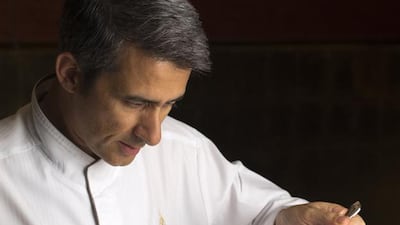Patrons are treated to a sensory experience when they sit down to a meal at fine-dining restaurant, Al Mahara.
Not only is the food five-star, the venue – in Dubai’s iconic sail-shaped Burj Al Arab – is home to a floor-to-ceiling aquarium teeming with giant groupers, stingrays and zebra sharks.
The kitchen is spearheaded by the hotel's executive chef, Maxime Luvara, and, in an exclusive interview with The National, he reveals the highlights of Al Mahara's seasonal menu.
What special dishes is Al Mahara serving this summer?
In Al Mahara, and also in our other à la carte restaurants, I compose the menu according to Europe’s seasons. Spring/summer is actually my favourite time of year, as the dishes we create are so colourful. It’s the season of the beautiful tomatoes, from the south of France and Sicily, that we use for a starter, for example, with stracciatella cheese, along with a refreshing lobster consommé. We’re also making good use of trumpet courgettes from Nice in risotto with barley and Parmesan cheese. As for amazing seasonal desserts, we use fantastic Italian apricots in vanilla syrup confit and served with liquorice mascarpone cream and a Basque custard pie. It was the invention of executive pastry chef Johannes Bonin, aka The Magician, and it’s to die for.
What is a stand-out signature dish this season, not only because of its ingredients but also because of the technique involved?
One of my favourites is the Alaskan king crab and foie gras ravioli served with stewed leeks in a vinaigrette and lightly creamed lobster-jus soup. The combination of the crab’s sweetness and the smooth sensation of the foie gras is just perfect. The ravioli cooking technique is also quite unusual. First, we sear it in a pan with olive oil as it gives the pasta dough a nice roasted flavour. We then deglaze the pan with a touch of crustacean jus, before slowly stewing the ravioli and letting the jus reduce.
Dubai is full of fine-dining restaurants. What’s unique about Al Mahara?
It’s unique because it affords you a truly one-of-a-kind experience that starts as you cross the bridge and pull up outside the opulent lobby of Burj Al Arab. You then step inside a golden elevator and enter the lavish interior of Al Mahara. The restaurant’s name, translated from Arabic, means oyster shell and upon entering the venue, the first thing you’ll see is a gold oyster shell and an aquarium full of exotic fish. Tables are situated around the aquarium, giving guests the chance to fully enjoy the exceptional ambience. For more privacy, a romantic meal or small family gathering, we also have two beautiful private rooms with aquariums. Our team of waiters and chefs work together with a single goal: that of blowing our customers away.
How many diners do you have daily and what do regulars favour?
In high season we can do 200 guests a day. Our loyal guests are very aware of our great seasonal products and throughout the year we’ll ensure there are always “specials of the day”. For example, we had a fantastic season with French green asparagus from Les Landes and white asparagus from Germany with fresh morels. In autumn, our dishes will have white truffle from Alba in Italy, while in winter, we’ll showcase black truffles from Périgord in France. It’s important for our customers to see a menu that is constantly changing. However, we also have dishes that are difficult to remove given their continued popularity. Two examples would be the wild turbot in vine leaves and the seafood cocotte.
Are there any challenges with cooking “below sea level”?
The only issue we have is not seeing daylight. Sometimes when my chefs do mise en place for many hours, I am sure that they dream of having a window where they could look out into the Arabian Gulf.
What produce is Burj Al Arab able to source from the UAE?
We have our local supplier of organic products called Organiliciouz. We receive great salads, herbs, vegetables and amazing organic cow milk from them. When I'm in Italy this summer, I'll bring back some great organic vegetable seeds for the Emirati husband-and-wife owners of the company. Hopefully, they'll grow here in Dubai.
What are your preferred ingredients to work with and why?
It’s actually changed a lot throughout my career. Coming from the south of France, on the Mediterranean, seafood used to be my favourite to work with. Now I must say that I’m increasingly interested in vegetables. When we create a dish, one of the most difficult things to do is to find the right garnish for the right protein. Meaning that you need to be creative, while at the same time respecting the original product’s taste. That’s a challenge I really enjoy.
When off duty, what do you commonly cook for yourself?
When I cook at home for my family or friends – usually at the weekends – I like to cook dishes that are simple and geared towards sharing. For example, a whole fish cooked in the oven on a bed of Ratte potatoes and fennel. Or perhaps I’ll put a nice côte de boeuf on the barbecue and serve it with grilled vegetables and a tasty herb-lettuce salad, dressed with a fruity olive oil.
For reservations, call 04 301 7600, email BAArestaurants@jumeirah.com or go to www.jumeirah.com
rduane@thenational.ae

